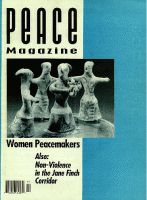
Peace Magazine Jul-Aug 1992, page 29. Some rights reserved.
Search for other articles by Stephen Dankowich here
The Canadian Citizens Assembly for the Helsinki Process (CCAHP) has received reports from two of the six Commissions of the Helsinki Citizens Assembly (HCA), convened in Bratislava in March of this year. Commission m Peace Politics and Demilitarization:
The 150-member commission has created four working groups whose common aim is to assure non-violent democratic resolution of persistent problems. The first area is European security and recommends an arrangement based on Article 52 of the U.N. Charter. It will work to strengthen the CSCE's conflict resolution capacity and link this to the U.N. It sees security incorporating economic and ecological issues, and having the ultimate aim of making Europe nuclear-weapons-free.
The second working group links democracy and demilitarization, seeking to ensure democracy from below. Proposed projects include: demanding from the CSCE a flow of information on defense matters and military budgets; demanding of the U.N. that it democratize itself, and appealing to the U.N. to establish "Green Berets," an environmental "defence force" analogous to the Blue Berets; and a campaign against a common European army.
The third working group concerns Iraq, Kuwait, Turkey, and the Kurds. It calls upon democratic governments oooperating within the CSCE to provide facilities for democratic opposition groups from authoritarian countries.
The fourth working group is training in mediation for peace-building in situations of large scale violence. It will be working to provide a pool of able and qualified mediators to work in a variety of conflict situations.
Participants chose to work on a number of themes, including women's health-care and reproductive rights, violence against women, female migrant labour, the impact of economic change on women's situations, and women's political participation.
At a conference on Healthcare and Reproductive Rights, organized by the commission in late 1991, discussions focused on Ukrainian women and nationalism, the impact of economic changes in Russia on women, and the restrictions of Polish women's rights to abortion. A booklet has been published.
The violence against women working group heard from women from Belgrade and Zagreb active in establishing SOS lines. With increasing stress levels in central and eastern Europe, we witness a correlative increase in alcoholism and violence against women. It is proposed that the HCA establish a data-base for women's self-help groups.
The female migrant labour working group concluded that the intersections of gender, race and class are at the heart of the New World Order, and are dependent on each other. There is a paucity of information currently available, but it is generally acknowledged that women often work in smaller enterprises with poor safety regulations, low pay and difficult hours.
The women and politics working group considered two models of political participation-the assimilation model where women fit into a male-defined political framework, and a liberation model where women and men together redefine the extension of human rights and responsibilities. With the abolition of quota systems for women's involvement in politics in Central and Eastern Europe, there has emerged a dramatic decline in the numbers of women in politics. However, in party/state communist regimes, women were seen as token figures in politics, accorded little political education and denied the necessary information or resources to develop more political awareness.
The working group dealing with the impact of economic change on women's situation considered the increasingly generalized exploitation of women by transnational companies. It also dealt with the negative perception of feminism in Eastern Europe, where the movement is often perceived to be against men, and feminists are seen as a unfeminine."
All reports indicate that the Women's Commission was cooperative, collaborative and very good fun too. Some women, including those from Albania, had not before left their country or participated in such a large international assembly. The networking is still very much about learning and raising consciousness.
The Women's Commission concluded that women's rights, needs, and aspirations were not considered a priority in other Commissions.
To receive further details or to get actively involved in the HCA and its commissions, contact Stephen Dankowich (National Secretariat CCAHP), do ACT for Disarmament, 736 Bathurst St., Toronto Ontario, M55 2R4, phone 416-531-6154 or fax 416-531-5850.

Peace Magazine Jul-Aug 1992, page 29. Some rights reserved.
Search for other articles by Stephen Dankowich here